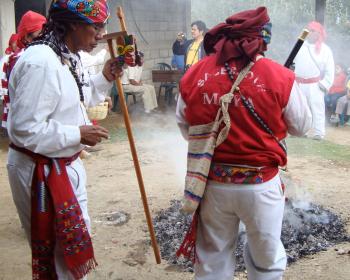
On May 8, 2012, at 10:30 AM, Uqul Tinamit community radio station, a Cultural Survival Community Radio Program Partner, that serves the Achi Maya village of San Miguel Chicaj, Baja Verapaz was raided by the Guatemalan police and the Ministerio Publico. Bryan Cristofer Espinoza Ixtapa, the radio station volunteer who was on the air at the time on the raid, was detained by the police. In addition, the radio station’s transmitter, computer, and sound mixer were seized.
The following is a guest blog post by anthropologist Lisa Maya Knauer, who does fieldwork with Cultural Survival's Guatemala Radio Project and the larger community radio movement in Guatemala.
The newly elected President of Guatemala, Otto Perez Molina and the 158 members of the Guatemalan Congress took office in February of this year. Since then, conflicts between the major political parties have paralyzed the Congress. Six pieces of legislation, backed by a broad coalition of Indigenous and small farmer’s organizations, remain pending from the previous congress. These bills would protect sacred sites, promote community controlled rural development, and create broadcast licenses for community radio stations.
The president of Guatemala met with leaders of the community radio movement and participants in the Indigenous and Campesino March on April 19th in follow-up to the demands brought by marchers during their nine-day trek from Coban, Alta Verapaz to Guatemala City at the end of
On March 13th the UN High Commissioner for Human Rights, Ms. Navi Pillay, visited Guatemala, giving an audience to the grievances of the Indigenous peoples in the country during a visit to the highland town of Totonicapan.
Thousands of Indigenous peoples and campesinos in Guatemala have embarked on a nine-day protest march to the capital city, covering over 214 kilometers. Organized by the Comite de Unidad Campesino, (CUC) the march demands the attention of the State of Guatemala, as well as local, national, and international media to the issues facing the rural Indigenous and campesino majority of the country.
San Luis Jilotepeque is a town in the department of Jalapa, located on the southeast of Guatemala.
The constitutional court of Guatemala has failed to issue a decision on the constitutionality of the current Telecommunications Law, despite the established two-month limit for a decree.
On the last weekend in January 2012, Cultural Survival's partner network of pilot radio stations gathered together once again in San Mateo, Quetzaltenango to participate in a workshop about the Mayan calendar and spirituality. Cultural Survival invited representatives of twenty different radio community stations to learn about the meanings behind the K’iche Maya solar calendar from two Mayan spiritual guides from the town of Momostenango, Totonicpan, who addressed in detail what the 2012 change means for the Mayans.